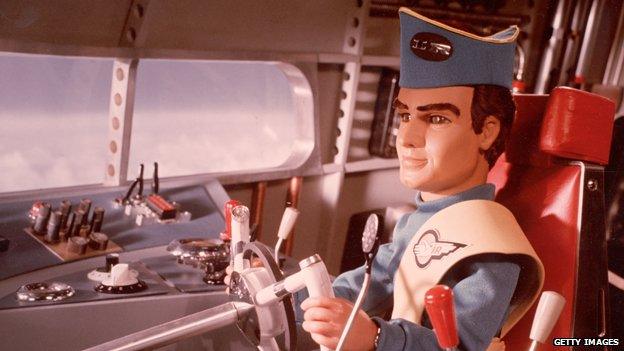Children's TV nostalgia as a way to guess someone's age
- Published

Beloved children's show, the Clangers, is being resurrected, with a new series in production for 2015. If you have fond memories of the original you're probably in your 40s or 50s, writes Tom Heyden.
It's usually impolite to ask someone's age.
But those with a modicum of cunning and a comprehensive knowledge of British children's television can soon date someone with a method that's almost as accurate as counting tree rings.
With an original run of 1969 to 1974, anyone who strongly reminiscences about the Clangers was more than likely a kid during that era.
My memories of Round the Twist, Saved by the Bell and Power Rangers puts my childhood in the early 1990s. Fans of Dangermouse, which ran from 1981-1992, are probably mostly now in their 30s.
"In a sort of geological way, you can see which layer of TV generation you belong to," says TV critic Andrew Billen. But to accurately use kids' TV as a measuring tool it's best to pick shows with relatively short runs.
The Animals of Farthing Wood ran from 1992 to 1995. It's probably safe to assume most fans are still in their 20s.
Billen's favourite programmes were Stingray, Captain Scarlet and Thunderbirds - placing him as a child of the 1960s, when these shows "reigned supreme".
But it's an imprecise art. "There's a window of people who know those very well," says Billen, "[but] there's another little window of people who know Thunderbirds from the 1990s when they repeated it."
And fans of long-running shows like Blue Peter could be anywhere from about three to 63. The same applies to Tom and Jerry or Scooby-Doo.
Bagpuss ran for only a few months in 1974 but it was repeated so much afterwards that you'd be hard pressed to find many without at least passing affection for it.
Jamie and the Magic Torch originally ran from 1976-1979, before being repeated during the 1980s. So fans might be 40, they might be 30, but they're very unlikely to be 20.
Ben 10 fans will be younger than Mr Benn ones. But both will be younger than those of Bill and Ben.
Follow @BBCNewsMagazine, external on Twitter and on Facebook, external